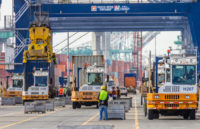A new 1-MW rooftop solar installation on the World Cruise Center at the Port of Los Angeles relied on a self-ballasted racking system to protect aging structures while offsetting increased electrical demands from an Alternative Maritime Power system that lights up docked cruise ships.


Of the five bidders vying for the $8.5-million contract in March 2009, Los Angeles-based Martifer Solar was the apparent low bidder but didn’t provide a bond in time, so the contract went to the next-lowest bidder, Cupertino Electric Inc.
The port included two requirements in the design-build contract: it had to be a non-penetrating attachment system and produce at least 1,000 kW of DC power on 71,500 sq ft of the cruise-ship terminal’s rooftop.
Cupertino Electric project manager Meisa Kassis said those requirements led to the design of 16-in. by 16-in. square pans anchored by concrete ballasts to house 5,140 monocrystalline photovoltaics. “Because of the limited roof area, we used the higher-efficiency monocrystalline modules,” Kassis said.
The non-penetrating ballasting system helps maintain the structural integrity of the 40-year-old building, says Phillip Sanfield, a Port of Los Angeles spokesman.
Once the owner approved the design, staging and logistics in the operating port became a challenge. The port provided some indoor space for prefabrication to limit work on the rooftop, where crews installed 42-in.-tall, full-perimeter guard rails. However, the contractor scheduled crane picks around days that cruise ships were not in port. The system became operational in fall 2010.
The project was the first of three phases in a five-year solar-power-generation initiative that could result in 10 MW annually produced by the 1.16 million sq ft of solar panels at the port. Even that project is just part of a planned 1.3-GW Solar L.A. Program slated for significant completion in 2020.

